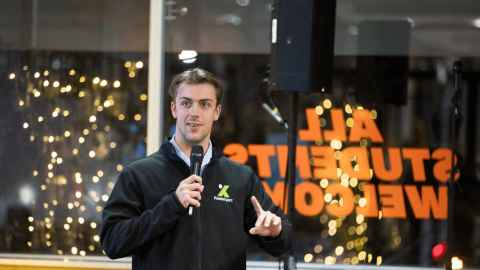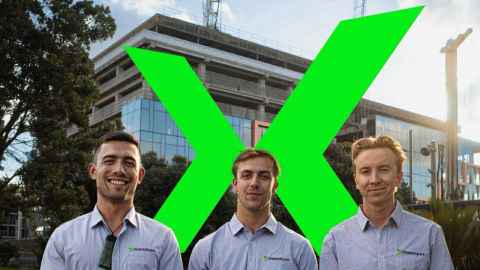AI-driven platform set to transform construction waste management
2 October 2025
From wasted timber to repurposed resources, a University of Auckland alumnus is reshaping how we think about construction waste.

Construction and demolition waste makes up more than half of Aotearoa New Zealand’s annual landfill contribution, draining billions of dollars from the economy and driving up the cost of new housing.
Jean-Luc Ellis, a University of Auckland law graduate and co-founder of WasteXpert, is tackling this challenge head-on. He was recognised with a University of Auckland Blues Award for Most Meritorious Innovation and named 2024 Youth Entrepreneur of the Year by the Global Entrepreneurship Network New Zealand (GEN NZ).
The idea emerged from his experience running ERC Contracting, a construction labour firm. “I got to experience firsthand the wastefulness of the construction and demolition industry. The real kicker? The flow-on impact of these inefficiencies contributes to the unaffordability of new homes.”
Ellis and his co-founders Max Lawton and Logan Soole have developed WasteX, a bespoke resource management platform designed to live-track everything entering and leaving a construction site, from materials and waste to water, energy and carbon emissions. What makes it unique is its ability to address long-standing problems with data capture through an innovative ingestion engine, providing contractors with accurate, real-time insights.
By pairing on-the-ground support with digital tools, WasteXpert enables contractors to separate and recover materials, while creating a transparent picture of resource use. This approach turns waste into a resource, helping companies cut costs and reduce their environmental footprint.
In just eight months, WasteXpert has diverted 24,600 kilograms of waste from landfill in a project with Waitematā Local Board and several private construction sites. Across all projects to date, the team has tracked more than 261,000 kilograms of waste - roughly the weight of a fully loaded Boeing 787 Dreamliner.
WasteXpert and ERC have also worked with Auckland Recovery Office deconstruction panellists to divert over 50 tonnes of timber, joinery and weatherboards for reuse, while in the commercial fit-out sector, more than 30 tonnes of furniture have been redirected to schools, iwi and community organisations.
The impact goes beyond waste reduction. It strengthens communities, supports education, and ensures valuable resources stay in circulation rather than being discarded.
Shifting a traditional industry has not been easy. Resistance to change has required an education-first approach, while access to funding remains a hurdle. “Like most founders, we’ve had to work in our business for free for over two years,” Jean-Luc Ellis notes. “At the same time, New Zealand investment funds and VCs remain too risk-averse. That needs to change if we want to grow the start-up space.”
Despite the obstacles, the WasteXpert team has gained valuable insights. “Momentum comes from starting, testing and refining, not waiting for the perfect moment,” he says. “And impact multiplies when businesses, councils, iwi and community groups work together rather than in isolation.”
Ellis says that taking part in entrepreneurial programmes at the University of Auckland, supported by the Business School’s Centre for Innovation and Entrepreneurship (CIE), gave WasteXpert an important boost. Winning the Velocity $100k Challenge in 2023 provided funding and validation, while entry into the Venture Lab Incubator programme in 2024 helped refine the business model and product offering. “These experiences enabled us to drill down into the root cause of our problem and identify the best possible solution and approach to launch,” he says.

The next milestone is close: the launch of the AI-powered WasteX platform, the first complex system of its kind available to New Zealand’s construction and demolition industry. Expansion into the Australian market is planned next year, with entry into the United States set for 2026 too.
For students and young founders considering entrepreneurship, Jean-Luc Ellis’s advice is straightforward: start before you feel ready. “Progress comes from small, consistent steps, and the world needs people who are willing to act with purpose rather than wait for the perfect moment.”
Contact
Questions? Contact the Centre for Innovation and Entrepreneurship for more information.
E: cie@auckland.ac.nz